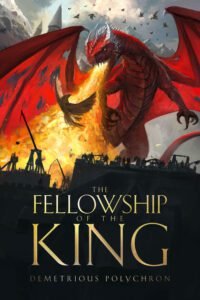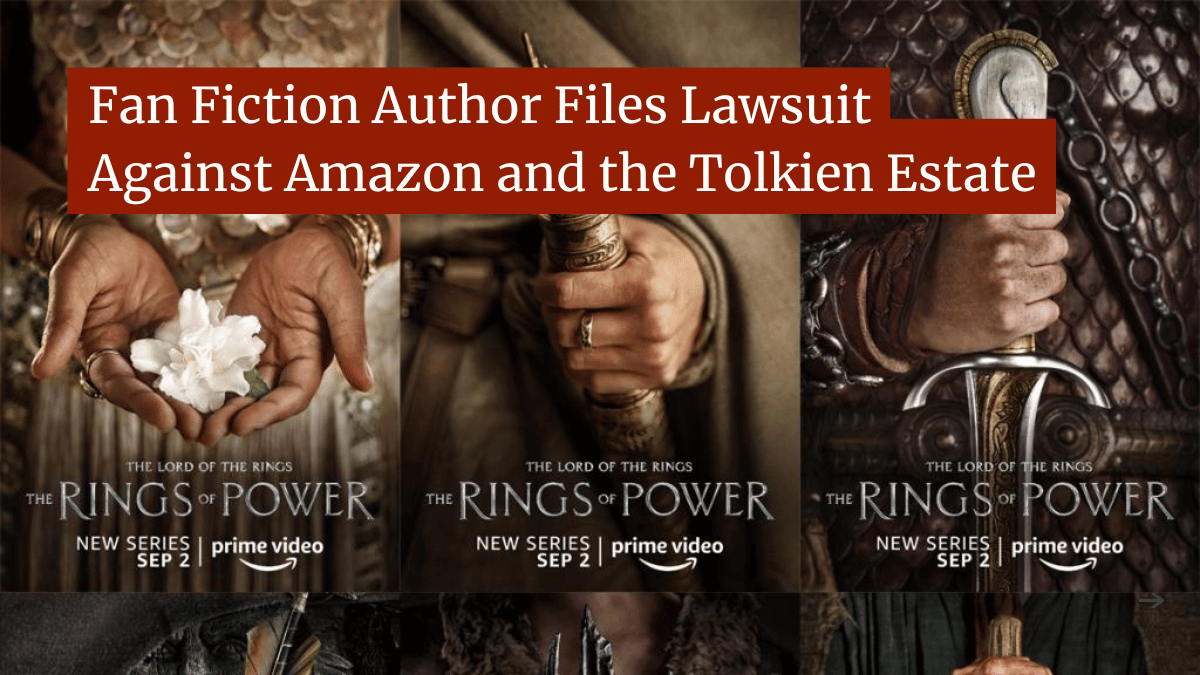Fan Fiction Author Sues Amazon, Tolkien Estate

Last week, PCGamer broke the news that fan fiction author Demetrious Polychron had filed a lawsuit against both Amazon and the estate of JRR Tokien over alleged copyright infringement of his work, the fan fiction book The Fellowship of The King, when creating The Rings of Power TV series.
According to the lawsuit, Polychron finished his manuscript in 2017 and registered with the United States Copyright Office. Shortly after that, he claims that he sent a letter to Simon Tolkien, the grandson of JRR Tokien and director of the estate, describing and outlining the manuscript. However, he says he received no response.
In 2019, he claims he hired an attorney to reach out to the Tolkien Estate again, but that the estate’s attorney “rebuffed any attempt at collaboration the very next day.” He then claims to have personally delivered a copy of the manuscript to Simon Tolkien “at his home” and received no response to that either.
In September 2022, right as The Rings of Power started airing, Polychron then published his book through Amazon itself, where it was the first of a planned seven book series. There it remained for sale until the lawsuit was filed and details about the case became public.
Though Polychron admits that his book is “inspired by” The Lord of the Rings, he claims that his work is a “wholly original book and concept” that, he claims, The Rings of Power copied in multiple ways. As such, he is seeking some $250 million in damages.
However, calling his case a longshot is a drastic understatement. Polychron’s book has already been pulled from Amazon and, in the case itself, he has many serious hurdles to overcome to prove any infringement, let alone $250 million worth of it.
The Legalities of Fan Fiction
As we discussed way back in 2010, from a legal standpoint, fan fiction exists in a strange space.
As far as copyright is concerned, fan fiction is a derivative work of the source material. Original authors or other rightsholders have the sole right to create and authorize sequels, prequels and other new works based on their original.
However, though different creators have had different attitudes toward fan fiction, fan creations have, in general, been widely tolerated. Creators simply don’t want to go to legal war with their fans and their communities, especially over non-commercial use.
But that doesn’t mean that there haven’t been attempts to commercialize fan fiction.
In 2013, Amazon launched the now-defunct Kindle Worlds product. That service, which initially signed on three licenses, allowed authors to legally write and sell fan fiction works and then split the revenue with the original authors.
However, far more authors began to find ways to parlay their fan fiction popularity into commercial careers. For example, E.L. James’ Fifty Shades of Grey began life as Twilight fan fiction. Cassandra Claire, the author of the Shadowhunter series, got her start in fan fiction circles, specifically for Harry Potter and, appropriately enough, Lord of the Rings.
However, the most famous case involved a “independent” Star Trek film entitled Axanar, which resulted in both a lawsuit and a settlement that placed severe restrictions on both it and future fan fiction work.
This, in turn, brings us to Polychron, who not only wrote fan fiction based on Lord of the Rings, but took the step to self-publish the book through Amazon. As we’ve discussed before, Amazon does not have significant filters on its self-publishing platform, meaning that it’s likely Polychron’s book went unnoticed by both Amazon and The Tolkien Estate until after the lawsuit was filed.
That said, does Polychron have a chance at winning? To be clear, there is a path, but I think he would have an easier time simply walking into Mordor.
The Nearly Impossible Path to Success
The first thing that Polychron would have to prove is that Amazon and The Tolkien Estate had access to his work. Though that might seem simple since his book was published on Amazon, it’s actually a very difficult argument.
First, he published the book in September 2022, as the TV series was being released. The show had undoubtedly been in production and writing for years before that. However, even that doesn’t prove access as Amazon, quite clearly, doesn’t read the books that it helps users publish. The fact that the book is now removed points to Amazon being completely unaware of its existence.
However, Polychron’s arguments point to multiple attempts to send the manuscript to The Tolkien Estate. However, the estate almost certainly has a policy against reading unsolicited manuscripts, for precisely this reason, and proving they actually read it or had the ability to read it is going to prove difficult.
But once access is proven, the real challenge begins. Under copyright law, Polychron can, theoretically, protect anything that is both protectable under copyright law and unique to his work. This means he can’t claim any characters, settings, plot elements, world building, etc. that comes from the original books and movies.
However, any elements that are not from the original material, still have to be proved to be unique enough to qualify for copyright protection. For example, any tropes common to the genre, character details that are too basic to be protected and so forth are also eliminated, even if they didn’t come from Lord of the Rings.
Finally, even if he can prove that elements of his story were original and did qualify for copyright protection, he has to show both that Amazon and the estate copied those elements and that the copying amounts to copyright infringement.
This, in turn, is a really high bar under the easiest of circumstances, and these are not the easiest of circumstances.
Each and every one of these is an extremely high hurdle and, even if he is able to overcome some of them, the odds of overcoming all of them are unfathomably low.
While there’s always a chance and litigation is inherently unpredictable, it’s hard to imagine a more long shot case than this one. But, even if he did manage to defy the odds and procure either a favorable settlement or a judgment in his favor, the odds of him receiving a quarter of a billion in damages are also virtually nil.
His statutory damages are limited to $150,000 and, though he might be able to claim more actual damages, proving that his work resulted in them earning a quarter of a billion dollars is unlikely, even if the show did cost more than $1 billion to make.
When one looks at the challenges before this case, it’s pretty obvious that the most likely outcome of this case is that it is dismissed quickly and forgotten even more quickly.
Bottom Line
In the end, Polychron did himself a great disservice with this lawsuit. His book was flying under the radar at the time he filed the case. Neither Amazon nor The Tolkien Estate were aware of it and, if they were, they clearly weren’t motivated to do anything about it, even file a takedown notice.
Now, he’s made himself a target and, even though there’s almost no chance Amazon and The Tolkien Estate infringed him, it’s a near certainty that he infringed Lord of the Rings.
To call this case ill-advised is an understatement. The adage about poking the bear comes to mind.
All that said, I doubt that Polychron is lying. As we’ve seen before, creating a convincing fake plagiarism story is easy. We, as humans, are trained to see patterns whether they exist or not. I believe that Polychron genuinely feels wronged here.
That said, it doesn’t make this lawsuit any wiser or more advisable. It was a bad move that has already resulted in the removal of his book and may, down the road, create even more legal trouble.
Hopefully, this will be resolved quickly, and both sides can move on equally fast.
Want to Reuse or Republish this Content?
If you want to feature this article in your site, classroom or elsewhere, just let us know! We usually grant permission within 24 hours.
